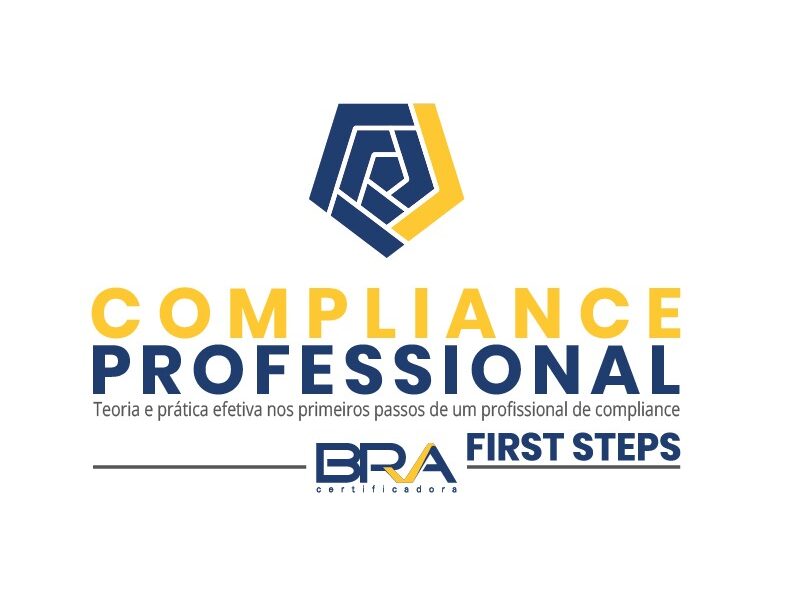COMPLIANCE PROFESSIONAL FIRST STEPS
Make an accessible, effective, and secure investment.
With COMPLIANCE PROFESSIONAL FIRST STEPS, you’ll be taking the first and consistent steps to become a recognized, differentiated, and specialized Compliance Professional, Consultant, or Auditor! And all this with the unique perspective of a Certification Body proven to be specialized in the field!
The knowledge gained throughout the program will provide a solid foundation to tackle the challenges and responsibilities of this career in the corporate world. Additionally, you will be well-positioned to enter the job market with a set of skills valued by companies seeking professionals committed to integrity and compliance with anti-corruption laws and regulations.
Transform your career. Enroll in our course
Program Content:
-
Module 1 > History
You will learn and understand the historical reasons for the creation of current legislations and actions related to Compliance / Integrity.
-
Module 2 > National and International Legislation
We will address how National Legislation was created, taking into account both successful and unsuccessful legislative experiences from other countries.
-
Module 3 > Decree Law 11129 and its characteristics
Clear understanding of what an Integrity Program is and the legal approach, fundamental for the development of the Compliance Officer.
-
Module 4 > Integrity Program – Overview
Similarly, an overview of all the items included in an Integrity program, regardless of the company’s size or scale.
-
Module 5 > Integrity Culture
This is the major challenge! We will demonstrate how to embed Compliance culture within the company’s culture, making it a part of management priorities, including its reflection in goals and recognition actions. Compliance should be integrated into daily activities and seen as an integral and supportive part of the business.
-
Module 6 > Senior Management Support
The success of an effective Compliance program is contingent on the support received from the company’s Senior Management. They are the conductors who will set the tone and guide the entire organization in the right direction. This module precisely discusses this fundamental figure.
-
Module 7 > Compliance Officer and Ethics Committee
We will demonstrate the fundamental importance of having a Compliance officer within organizations. The Compliance leadership should have independence, autonomy, and sufficient resources for the program’s success. The Ethics & Compliance Committee is part of an appropriate governance structure to ensure the commitment of the entire team and effective compliance with internal controls.
-
Module 8 > Code of Ethics
How to effectively convey the message from the company’s senior management, principles, and values to all employees, both internal and external audiences? That’s the challenge of the Code of Ethics, and in this module, we will unveil all its characteristics and peculiarities.
-
Module 9 > Procedures and Policies
Policies and complementary procedures to the code should be developed, especially the Compliance policy, Anti-corruption policy, Relationship with Public Agencies policy, Conflict of Interest policy, Due Diligence policy, Consequences Management policy, as well as all those that mitigate critical risks identified in the assessment.
-
Module 10 > Communication and Training
Training and communication are complementary and help the company disseminate internal norms and applicable external laws, including the Code of Ethics & Conduct and the Anti-corruption Law. The training should cover all levels of the organization, and the use of examples and case studies with appropriate language and format for each audience is recommended.
-
Module 11 > Risks
In this module, we will explore the main activities and processes of the organization to identify and assess possible risks and/or focal points related to corporate integrity, aiming to develop the Integrity Risk Matrix.
-
Module 12 > Whistleblower Channel
An effective Compliance Program offers means for a professional to seek clarification on current rules, as well as report occurrences or suspicions of rule violations. How to implement and operationalize it are the questions addressed in this module.
-
Module 13 > Due Diligence – Suppliers
In this module, we will discuss the importance of knowing business partners and third parties with whom the company interacts well, as Law 12.846 (as well as several other foreign anti-corruption laws) holds companies objectively responsible for acts of corruption committed by third parties, whether or not the contracting company is aware of it.
-
Module 14 > Timely Interruption, Remediation, and Disciplinary Measures
Case management requires methodology and intelligence. The investigative process must be impersonal and focused on determining the truth of the matter and seeking evidence to confirm or dismiss the accuracy of the report, using all possible and legal tools.
-
Module 15 > Sponsorships, Donations, Mergers, Acquisitions, and Corporate Restructuring
As determined in Decree Law 11129/2022 itself, lack of attention or negligence regarding the theme.
-
Module 16 > Continuous Monitoring
As the course conclusion, understanding continuous monitoring as a way to keep the program up-to-date and always seeking improvement, better processes, policies, and procedures, similarly to how personal and business relationships continually improve, so does the Integrity Program.
